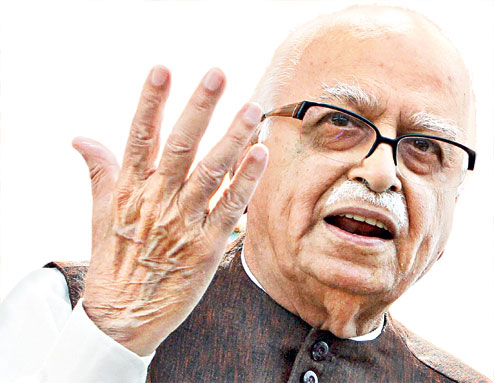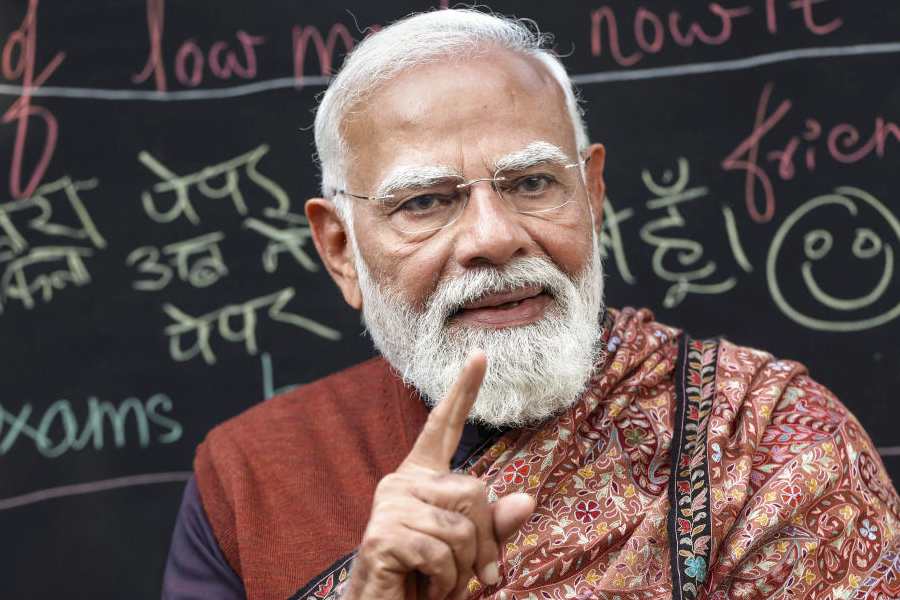 |
The adjectives are not what they used to be. Even some years ago, they called him the Iron Man. He was “resolute”, they said, a “shrewd” politician. The pater familias of the Bharatiya Janata Party (BJP) — or Dada as many called him — was earnest, impartial and patient.
Party insiders now call him “tetchy”, “insecure” and “preachy”. He lives in the past and not the present, they say. His speeches course a familiar trajectory, they complain. They hark back to yesteryear with the preface, “Mujhe smaran hai…” (I recall). “He has ceased to inspire us,” a leader says.
For Lal Krishna Advani, the beginning of the end is nigh. He was the one who steered the party to victory after a widespread movement over Ramjanmabhoomi and the Babri Masjid. But the party’s post-Ayodhya generation only nurses sepia-tinted images of the Babri demolition. For them, Advani is as much a part of history as the tumultuous developments of the early Nineties.
Clearly, all’s not well in the BJP. Infighting has always marked the second rung of the party — led by stalwarts such as Arun Jaitley and Sushma Swaraj. But now, the barbs are being directed at the man who groomed them all.
Advani, of course, has got a whiff of the dissent in the air. Recently, he asked a visitor if it was true that the RSS or the Rashtriya Swayamsevak Sangh — the parent body of the BJP — was planning to disallow those above 75 from contesting elections. The former BJP president, 85, would obviously have no role to play if that were to happen.
But, significantly, Advani indicated that he would not follow the diktat if it were put into practice. He was convinced that the Sangh’s motive was to pension him off under the ruse of effecting a “generational make-over”.
Advani’s loyalists, dwindling in number by the day, are upset with such talk. They point out that it was he who sculpted the BJP as a credible anti-Congress option out of debris and dust. They laud his political understanding, organisational skills, eye for talent, large-heartedness and diligence.
The “stars” on the BJP’s firmament today — former ministers Swaraj and Jaitley and chief ministers Narendra Modi and Shivraj Singh Chouhan — owe their emergence and ascendancy to him. Advani’s capacity to put up with individual shenanigans and angularities was so prodigious that in 1999, at a BJP meet in Nagpur, an unemployed Swaraj had lashed out at the National Democratic Alliance (NDA) government for going “soft” on terror.
The NDA was led by the BJP. Advani was then the home minister and she was his protégé. Far from feeling slighted, he ensured that she was inducted into the Atal Behari Vajpayee Cabinet and kept busy.
“Advaniji was the BJP’s spine, ideologically, politically and strategically,” acknowledges an office bearer. Such was his stature that, despite the controversy created by his 2005 Pakistan sojourn — where he praised Mohammed Ali Jinnah — the RSS was forced to project him as its prime ministerial candidate in 2009.
But the stature is not what it used to be. And to a large extent, his fall is linked to the rise of Gujarat chief minister Narendra Modi. That Advani was not a member of Modi’s rah-rah group became clear on March 3, 2013, at Delhi’s Talkatora Stadium where the BJP national council met.
That Modi was the cadres’ favourite was equally apparent. His verbal shots at the Congress and United Progressive Alliance (UPA) had the delegates in raptures and asking for more. But when it was Advani’s turn to speak, he praised the show-stopper ephemerally, but was expansive about Madhya Pradesh chief minister Chouhan and Swaraj, the leader of the Opposition in the Lok Sabha. The delegates read a political message there.
“Advaniji wanted to even out the playing field for the power sweepstakes for contenders such as Sushma and Chouhan and tell Modi he had serious competition,” a source states. “He poured cold water on the enthusiasm Modi aroused in us,” a delegate from a northern state remarks. “He deserved to be hooted out — but nobody mustered the courage to do so.”
To the cadre — ignited by the magic wielded by Modi — Advani seemed churlish. It retaliated by firing pro-Modi slogans at every platform. The crowds that greeted former Rajasthan chief minister Vasundhara Raje’s rath yatra, for instance, raised slogans in favour of Modi first — and then hailed Raje.
“It was time to get the message across that the Advani-Vajpayee era had passed. Vajpayee was the leader and Advani was the planner, organiser, strategist and mass communicator. Every generation of leaders has its place under the sun. Today, the sun shines on Modi,” the office bearer says.
But despite the growing resentment against Advani, the former deputy Prime Minister is not willing to hang up his boxing gloves yet. “He has put himself in the race (for the Prime Minister’s post) with others such as Arun Jaitley, Sushma and even Rajnath Singh,” asserts an MP.
Advani has his share of supporters, of course. When Lok Sabha MPs and buddies Shatrughan Sinha and Yashwant Sinha flagged off Advani as the one most eminently suited for the prime minister’s job because of his “acceptability and stature”, some within the party felt they had been put up by the candidate himself. When a BJP functionary plucked up the courage to ask Advani if this was true, he replied that he had “no idea” what was being talked about.
But on April 6 this year, it became clear that Advani, though increasingly being pushed to the corner, had not signed off his tryst with history. When the BJP celebrated its 33rd foundation day, voices in support of Advani were raised in what many believe was an orchestrated manner. “A pattern was discernible,” a source says.
Delhi BJP president Vijay Goel, considered close to Swaraj, repeated what the Sinhas had said. Days later, Bihar chief minister Nitish Kumar extolled the virtues of Advani. And in the West, the Shiv Sena cooed in favour of Swaraj’s candidature.
But as the Modi juggernaut moves on — garnering support with every step — it’s becoming clear that the dust it kicks up may engulf Advani. Already, his detractors are recalling a CBI case, accusing Advani and 20 others in the Babri demolition conspiracy, which is still alive in the Supreme Court.
“We don’t have a strong sense of public memory. But I guess in the existing circumstances, the demolition accusation seems a lesser kind of evil than the 2002 (Gujarat) pogrom,” says Pralay Kanungo, a JNU academic and author of RSS’s Tryst with Politics: from Hedgewar to Sudarshan.
Sections of the BJP, weary of Advani’s morality tales, are debating a strategy, forwarded by Advani himself, on the fundamental approach the party should adopt to win the 2014 elections.
The patriarch’s formula focuses on enlarging the existing five-party NDA into “NDA-plus” via an “imaginative re-projection of our commitment to secularism”. The proposition has been challenged from within.
In a meeting of the Parivar brass in January this year, in the presence of RSS chief Mohanrao Bhagwat, Advani was asked by the Vishwa Hindu Parishad’s Ashok Singhal on how many Muslim votes he had won with his praise of Jinnah. Advani was silent.
Clearly, Advani’s stars are on the decline — even though Modi is not the Parivar’s most favourite person. Party insiders point out that Modi pulverised the RSS and its affiliates in Gujarat. “That’s not all. He overturned our principle of individual-above-organisation and morphed into a cult figure, independent of the BJP’s apparatuses. It was something even Advani could not do because he remained yoked to the Sangh. And when he tried to break free, he failed,” says a party leader.
Ironically, he adds, Modi’s experiment has “endeared him lock, stock and barrel” to the cadre.
An MP elaborates on why Modi remains critical to the BJP’s game plan for the 2014 elections despite his personal and functional aberrations. “Modi won’t bring in allies right away. The issue is, we need a critical mass of political capital and the NDA’s accretion will come only when the BJP has a surplus electoral bank balance where it does not need a loan or collaterals,” he says. “In politics, every leader has his time and Modi’s time has arrived.”
Will the rank and file’s Modi zeal see him through, and sign the last post for Advani? Former BJP ideologue K.N. Govindacharya, who continues batting for Advani as Prime Minister, compares the process to the Subhash Chandra Bose-Jawaharlal Nehru conflict in the Congress. “The Congress wanted Bose but Gandhiji elected Nehru,” he says. A BJP leader retorts, “Gandhi didn’t have an election to win; we have.”
As the BJP stands on the crossroads of either keeping its allies and prospecting for new friends, or positioning a divisive Modi nationally, Advani, Swaraj and, to an extent, Jaitley are keeping their fingers crossed. They are hoping against hope that their best days in Delhi are not devoured by the man from Gandhinagar.
Advanispeak
• It was Dale Carnegie’s How to Win Friends and Influence People I would clearly rate as one of the five or six life-transforming books I have read so far
• I would like to mention here that I had a small role to play in the preparation of the RSS’s constitution
• Every crime inevitably leaves a trail. And the trail begins at the point where the motive for the eventual crime is first implanted in the perpetrator’s mind. Thus, looking back it does seem that Emergency rule was an exercise in self-preservation (for Indira Gandhi)
• I regard the Ayodhya movement as the most decisive transformational event of my political journey… Destiny made me perform a certain pivotal duty in this movement…
• On Modi, Advani’s take was, “I cannot think of any other leader in Indian politics in the past 60 years who was as viciously, consistently and persistently maligned, both nationally and internationally, as Modi… I have no doubt that my party’s spectacular victory in Gujarat would indeed become a turning point because it signals the BJP’s resurgence as the frontrunner in the next parliamentary elections.” (This was written before Modi scored a hat trick in 2012 and himself became the most serious claimant for the PMship).
(From his autobiography My Country My Life)










